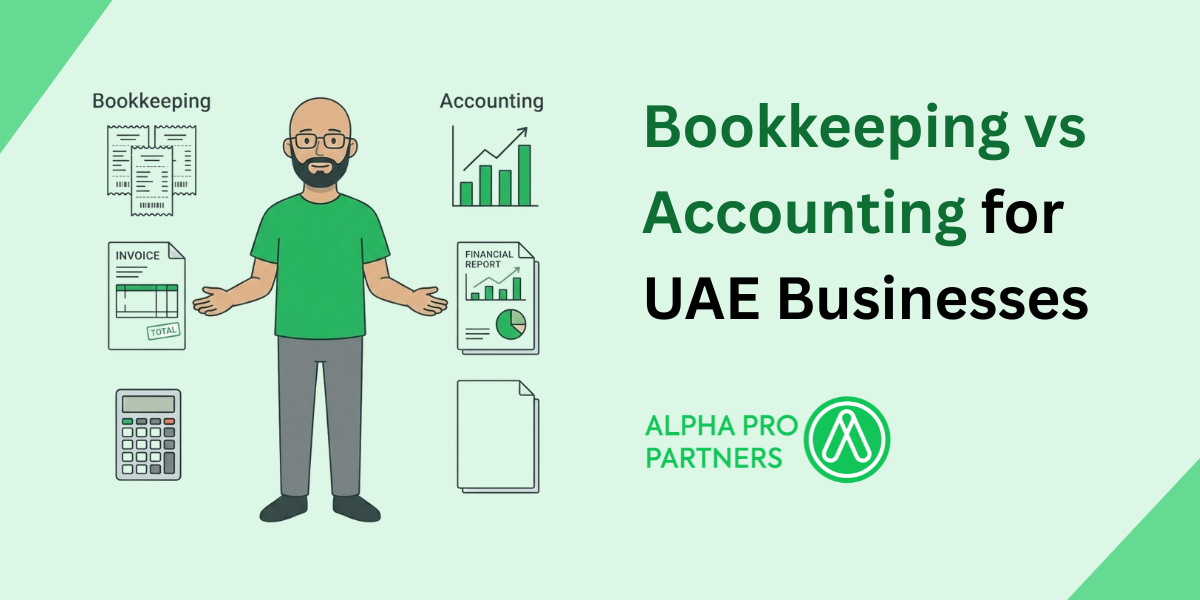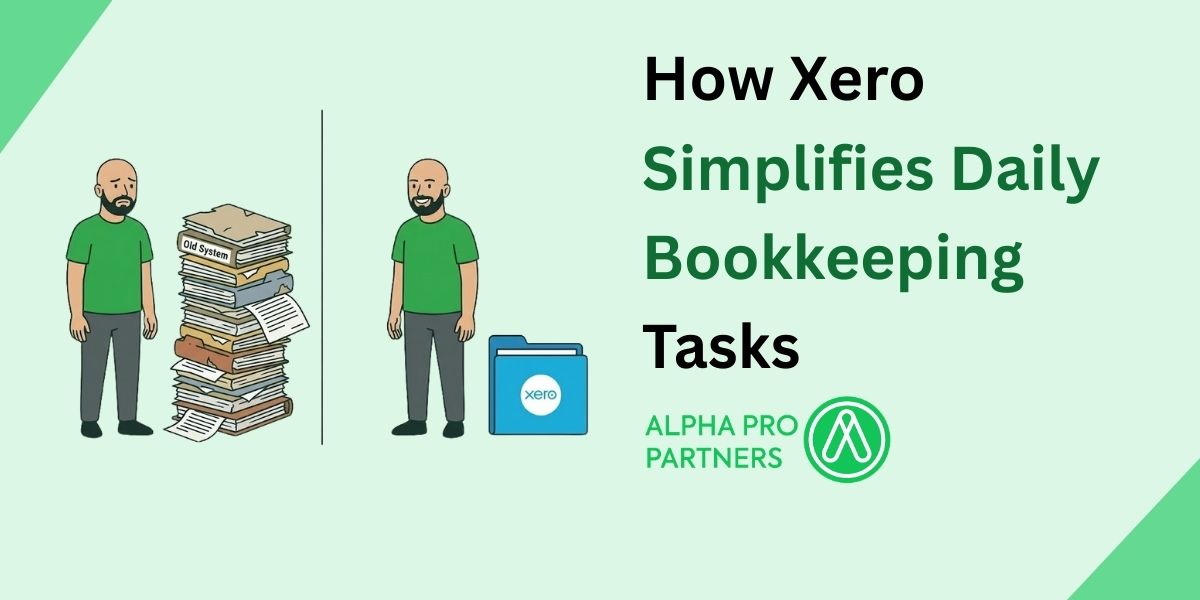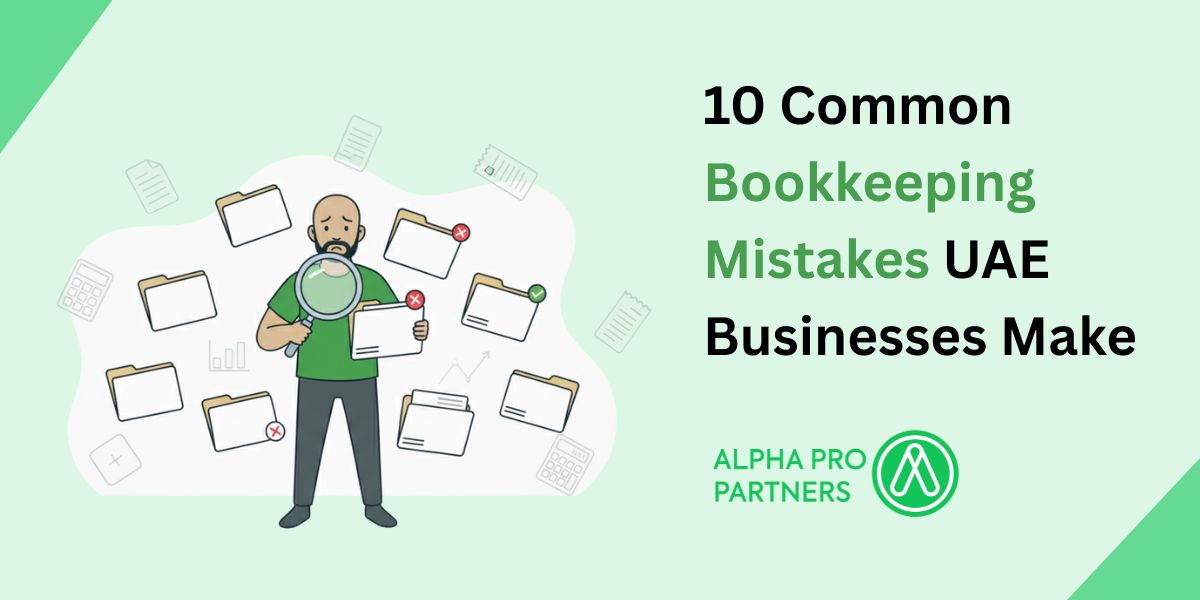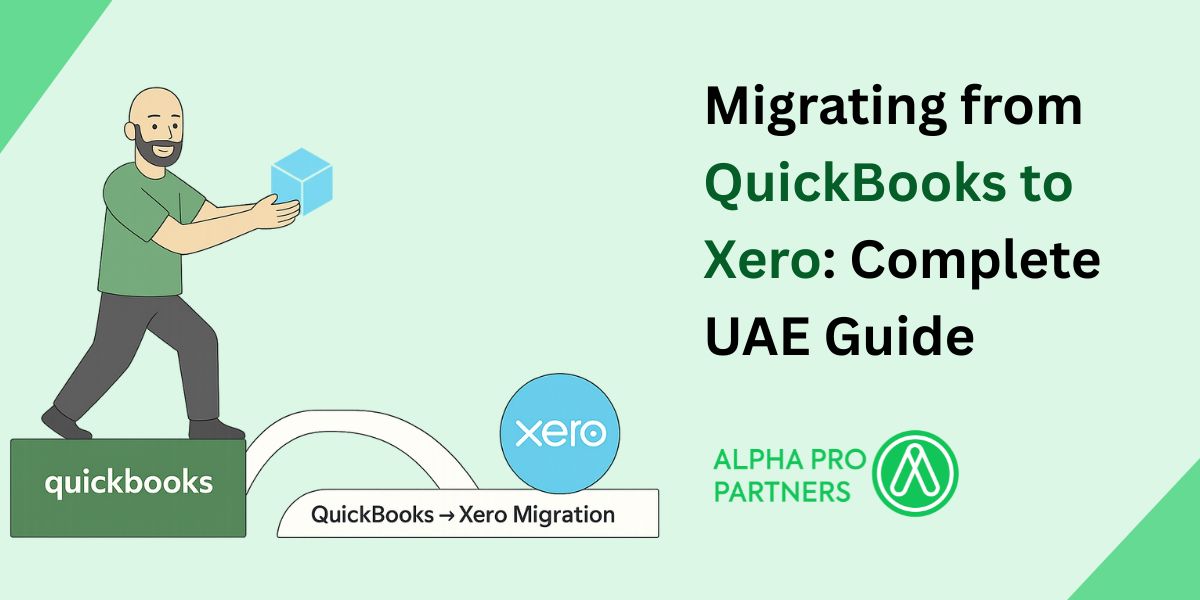Key Business Accounting Principles Every Entrepreneur Should Master

Running a business without understanding accounting is like driving with your eyes closed. It doesn’t matter if you’re just starting out or have been running your company for years. Knowing how to track your revenue, understand your financial position, and manage things like expenses and inventory can save you from big surprises and poor decisions.
In this guide, we break down the basics of business accounting in a way that’s simple, useful, and relevant. Our team at Alpha Pro Partners works with business owners across the UAE, and we’ve seen firsthand how having a solid handle on accounting can transform a company.
What We’ll Cover
- Business accounting 101
- How to recognise revenue and track expenses
- Why inventory matters more than you think
- Receivables, payables, and keeping your cash flowing
- The tech that makes it easier
Let’s get into it.
Understanding Business Accounting
Why Accounting Matters
Accounting isn’t just number-crunching. It’s the system that lets you see what’s working in your business and what’s not. With good accounting, you can:
- Track your income and expenses accurately
- Make smarter business decisions
- Stay compliant with tax rules
- Spot potential problems before they grow
Accounting vs Bookkeeping
Let’s clear something up: bookkeeping and accounting aren’t the same. Bookkeeping is about recording transactions. Accounting takes it further by analyzing those numbers to tell you the financial story of your business.
Core Accounting Documents
There are four main financial statements every business should know:
- Profit and Loss Statement (P&L): Shows your revenue and expenses over a period.
- Balance Sheet: Gives a snapshot of your assets, liabilities, and equity.
- Cash Flow Statement: Tracks the movement of money in and out of your business.
- Bank Reconciliation: Ensures what’s in your books matches your actual bank activity.
The Double-Entry System
This might sound technical, but here’s the gist: every financial transaction has two sides. If you spend cash to buy stock, one side of your balance goes down, the other goes up. This helps ensure accuracy and balance in your books.
Cash vs Accrual Accounting
- Cash accounting records revenue and expenses when money changes hands.
- Accrual accounting records them when they’re earned or incurred.
Many startups begin with cash accounting, but as you grow, accrual gives a clearer picture of how your business is performing.

Revenue Recognition and Expense Tracking
When Do You Recognise Revenue?
In accounting, you recognise revenue when it’s earned, not when the money hits your account. If you deliver a service in May but get paid in June, it still counts as May revenue.
The Five-Step Rule (Simplified)
1- Do you have a contract?
2- What are you delivering?
3- What are you getting paid?
4- Can you match payment to each thing you deliver?
5-Recognise revenue once it’s delivered.
Why Tracking Expenses Matters
Accurate expense tracking helps with:
- Budgeting and planning
- Understanding profit margins
- Calculating tax liability
Use tools like Xero or QuickBooks to record expenses as they happen. Don’t wait until year-end.

Inventory Management Basics
Inventory = Money on the Shelf
Inventory affects your costs, cash flow, and tax calculations. Holding too much stock ties up cash. Holding too little can cost you sales.
Types of Inventory
- Raw materials: The stuff you turn into products
- Work in progress: Products you’re still making
- Finished goods: Ready to sell
- MRO: Maintenance, repair, and operations supplies
Counting It Right
There are different ways to track inventory:
- Annual stock count
- Cycle counts (regular checks on portions of inventory)
- Real-time tracking with software
Bad inventory data can mess up your financials and even trigger audits. Stay on top of it.

Receivables and Payables
Accounts Receivable (AR): What’s Owed to You
AR is money your customers owe you. It’s an asset on your books, and managing it well means getting paid on time. Set clear payment terms, invoice quickly, and follow up.
Accounts Payable (AP): What You Owe Others
AP is what you owe suppliers. It’s a liability. Paying late hurts your reputation. Paying too early can affect your cash flow. The trick is managing timing.
Smart tip: Use automation to remind you of payment dates and avoid manual tracking.
How Tech Can Help
Today’s accounting software can do more than just track income and expenses. It can:
- Generate financial reports
- Sync with your bank account
- Send invoices and chase payments
- Help with VAT and tax filing
Choosing the Right Tool
Consider these when picking software:
- Ease of use
- Local support
- Cost
- Integration with other systems (like payroll or inventory)
Popular Options in the UAE
- Xero: Great for startups and SMEs
- QuickBooks Online: Powerful and well-known
- Zoho Books: Localised features, good for VAT
The Future: AI and Automation
Tools powered by AI can:
- Categorise expenses automatically
- Detect duplicate invoices
- Flag cash flow risks
- Reduce human error
It’s not about replacing accountants. It’s about helping them (and you) work smarter.
Wrapping Up
Good accounting is more than just staying compliant. It’s the foundation for a financially healthy business.
If you run a startup, SME, or freelance operation in the UAE, knowing how to:
- Read your financials
- Recognise income properly
- Track expenses and inventory
- Manage receivables and payables
- Use smart tools
...can save you time, stress, and money.
Need help setting up your books or getting things on track? Our team at Alpha Pro Partners supports small businesses with VAT, corporate tax, and accounting systems that grow with you.
Let’s make your numbers work harder for your business.
FAQs
What’s the difference between accounting and bookkeeping?
Bookkeeping is about recording transactions. Accounting includes analysing those numbers to support decision-making.
Is double-entry bookkeeping necessary for small businesses?
Yes. It helps you stay accurate and balanced. Even simple software uses this method.
Should I use cash or accrual accounting?
It depends. Cash is simpler, but accrual gives you better visibility. Growing businesses usually shift to accrual.
What are the key financial statements I need to understand?
P&L, Balance Sheet, Cash Flow, and Bank Reconciliation.
Can I do my own accounting?
Sure, but software helps a lot. Once your business grows, working with an accountant is usually a smart move.
How often should I update my books?
Ideally, weekly. Monthly at the very least.
Is inventory part of accounting?
Yes. It affects your cost of goods sold and net profit.
What’s the best accounting software for UAE businesses?
Xero, QuickBooks Online, and Zoho Books are popular choices with local support and VAT features.
How can I stay on top of receivables and payables?
Use automation tools to send reminders, track due dates, and schedule payments.
Why does accurate accounting matter so much?
Because it affects every financial decision you make. From tax to payroll to pricing, your numbers tell the story. Make sure it’s the right one.

.webp)
















.webp)
.webp)


.png)
.png)
.png)
.png)
.png)

.png)
.png)



.png)
.png)





.jpg)


.jpg)





.png)







.png)


